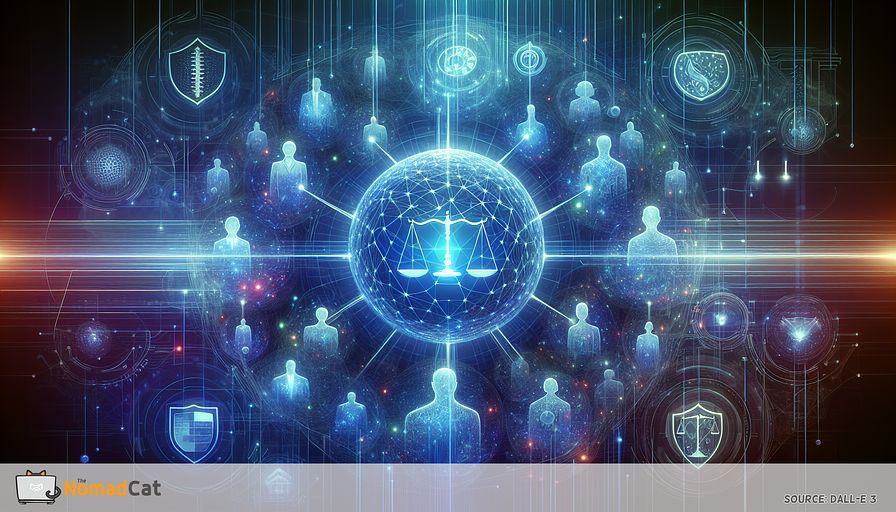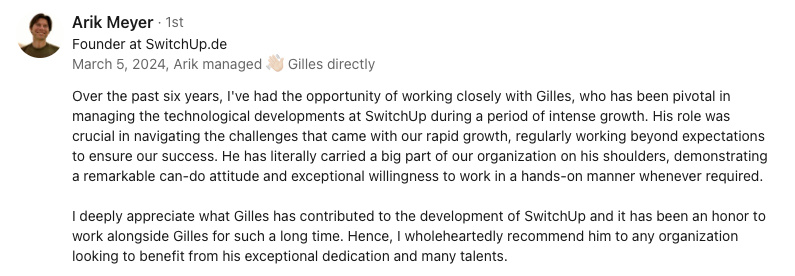The Role of Ethics Review Boards in AI Development
Abstract:
AI ethics and regulatory compliance are fundamental components in the development of artificial intelligence (AI). As a Chief Technology Officer (CTO), ensuring ethical AI involves prioritizing transparency, fairness, and individual privacy protection. Regulatory compliance and ethical AI are interconnected, with regulations providing a framework for ethical AI development. Collaborating with various experts, including Ethical AI Review Boards, is crucial in ensuring that AI projects are developed ethically and in compliance with relevant regulations. Prioritizing ethical AI and adhering to regulations is essential in building trust in AI systems, promoting social responsibility, and driving innovation.
introduction to ai ethics and importance in technological advancement
Artificial intelligence (AI) is no longer just a buzzword; it's a crucial part of modern technology that's changing the way we live, work, and play. With this transformation comes an equally important need to consider the ethical implications. Enter the Chief Technology Officer (CTO) – often seen at the helm, steering the organization towards innovative yet responsible AI solutions. It's not just about creating the smartest algorithms but ensuring they're fair, transparent, and respectful of privacy. Because let's face it, nobody wants a rogue AI making decisions about their lives. So buckle up, as we explore the vital role of ethics in AI development and how it meshes with technological progress.
role of regulatory compliance in ethical AI development
Let's face it: regulations are the unsung heroes of ethical AI development. They might not have the flash and dazzle of breakthrough algorithms, but they lay down the law—literally and metaphorically. The Chief Technology Officer (CTO) has a lot on their plate, and navigating the maze of legal requirements is no small task. However, these regulations provide a framework that ensures AI technologies align with legal and ethical standards. It's like having a rulebook to play a high-stakes game where the prize is trust and societal acceptance.
Regulations cover a broad spectrum, from data privacy to anti-discrimination standards. Here’s a quick rundown of their roles:
- Data privacy: Ensuring user data is protected and used responsibly. No one wants their info splashed across the internet.
- Fairness: Creating algorithms that treat everyone equally—because bias has no place in decision-making systems.
- Transparency: Making the processes and decisions of AI systems understandable to humans. We're not living in a sci-fi movie with black-box AIs making cryptic choices.
The interplay between these regulations and ethical principles drives responsible AI innovations. The CTO needs to stay ahead of the regulatory curve, guiding their team through changes and updates that might come rolling in. It's like surfing, but instead of waves, they're riding the tides of legal stipulations. At the end of the day, adhering to these guidelines isn't just about ticking boxes—it's about building systems that people can trust. And in the world of AI, trust is priceless.
importance of transparency, fairness, and privacy in ethical AI
In the world of AI, transparency, fairness, and privacy are like the three musketeers—inseparable and crucial. It's not just about tasks like data crunching but about how these tasks are carried out. Without these principles, AI development could wander into a minefield of ethical dilemmas. Let's break it down:
Transparency: It's essential for making AI systems understandable. Imagine a CTO working hard to create models, but if no one knows how decisions are made, what's the point? Transparent systems ensure users know what's happening under the hood.
Fairness: This means algorithms should treat everyone equally. Think of it like a fair game—no one wants a rigged AI deciding who gets a mortgage or a job. CTOs must actively work to identify and mitigate biases that can creep into these systems.
Privacy: Ah, the classic—nobody wants their personal data mishandled. Privacy in AI development ensures that user data is kept safe and used responsibly. It’s like the CTO is a bouncer, protecting the VIP data club from unwanted intruders.
For a CTO, integrating these values is not just another checkbox; it’s part of building AI that people can trust and feel safe using. So, whether it's a simple chatbot or a complex predictive model, embedding these ethical principles is a strategic move toward sustainable AI development.
collaboration with ethical ai review boards
The role of a Chief Technology Officer (CTO) extends beyond just leading the tech team; it often involves dancing with various ethical AI review boards. These boards, often composed of experts from diverse fields, ensure that AI projects aren't just cutting-edge but also ethically sound. It's like having a well-rounded panel of advisors guiding the ship - every voice counts, and each brings a unique perspective to the table.
Collaboration with these boards isn't merely about compliance; it fosters an environment where innovative ideas can thrive responsibly. These partnerships focus on a few key areas:
- Interdisciplinary expertise: Ethical AI review boards usually include ethicists, legal experts, and technologists. This melting pot of knowledge ensures that AI projects meet a wide array of ethical and regulatory standards.
- Objective evaluation: An external review can be incredibly valuable. These boards provide unbiased assessments, helping to identify potential ethical pitfalls before they become real issues.
- Continuous feedback loop: Regular consultations help to keep projects on track. Think of it as having a wise mentor who constantly nudges you towards the right path, ensuring both innovation and responsibility go hand in hand.
By collaborating with ethical AI review boards, the CTO can lead projects that not only push the boundaries of technology but also respect societal norms and values. This partnership is a win-win: it drives responsible innovation while ensuring regulatory alignment. Let's just say, it’s like having a pit crew in a high-speed race, making sure everything runs smoothly while you focus on winning the race of ethical AI development.
building trust in AI systems through ethical practices
Building trust in AI systems isn't as easy as pie, but it's absolutely essential. When tech leaders adhere to ethical practices and regulations, they foster public confidence. It's not just about obeying the law but creating a technology that people feel safe using. Imagine a well-functioning AI being akin to a reliable friend you can count on—always transparent, fair, and respectful of privacy.
The societal impacts of trustworthy AI are significant:
- Increased acceptance: When users trust AI systems, they are more likely to adopt and benefit from them. Think of Grandma finally embracing a virtual assistant because she knows it respects her privacy.
- Reduced fear of misuse: Ethical practices reduce worries about biased decisions or data breaches, turning AI into a tool for good rather than a potential danger.
- Enhanced credibility for companies: Organizations known for their ethical standards enjoy greater loyalty and credibility. It's like being known as the "good guy" in the tech industry.
For technology leaders, maintaining these ethical standards isn't just a box-ticking exercise—it's about aligning their work with broader social responsibilities. It's a win-win situation: ethical AI practices not only boost credibility but also contribute positively to society at large. Trust me, this ethical approach makes AI our ally, propelling us confidently into the future.
promoting social responsibility and innovation in AI
Who says ethics and innovation don't mix? When AI development prioritizes social responsibility, it often leads to breakthroughs that are not only high-tech but also heartwarming. Think of it as blending science and soul—an approach that makes technology both advanced and beneficial for society.
Integrating ethical standards can be a catalyst for innovation:
- Solving real-world problems: Ethical AI emphasizes creating solutions that address pressing societal issues, from healthcare inequalities to environmental sustainability. It's technology with a purpose.
- Boosting user trust: High ethical standards increase user confidence, leading to higher adoption rates and, consequently, more data to refine and improve AI systems. Trust fuels progress.
- Fostering collaborative culture: With a focus on ethics, companies often partner with academic institutions, governments, and non-profits. These diverse collaborations bring fresh perspectives and can lead to novel solutions. It's a win-win all around.
When CTOs navigate the fine line between cutting-edge technology and social responsibility, they create AI systems that are not just ahead of the curve but also aligned with societal values. By embedding social responsibility into AI projects, we don't just get smart systems; we get systems that are also kind, fair, and trustworthy. It's like having your cake and eating it too—but this cake makes the world a better place!
emphasizing the interconnectedness of ethics, regulations, and innovation
AI development isn’t just a technical endeavor; it's a balancing act between ethics, regulations, and innovation. Ethical principles ensure fairness and respect for users, while regulatory compliance provides a framework for legality and trust. Without these, innovation could turn into a high-speed chase with no brakes. This trio enables CTOs to build AI systems that are not only groundbreaking but also trustworthy and socially responsible. Like a well-oiled machine, these elements work together to propel us toward a future where technology benefits everyone. So, here's to a harmonious blend of ethics, regulations, and cutting-edge innovation—because that's the real game-changer in AI development.
You might be interested by these articles:
- Guide to Ethical AI for CTOs: Ensuring Fairness
- Navigating AI Ethics for Tech Leadership
- Turning Compliance Challenges into Innovation Opportunities





